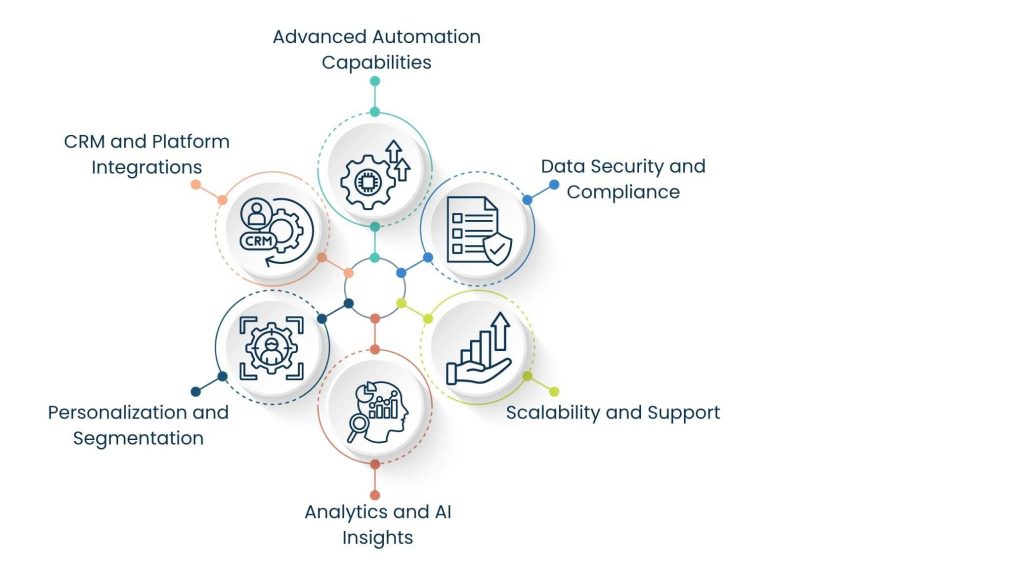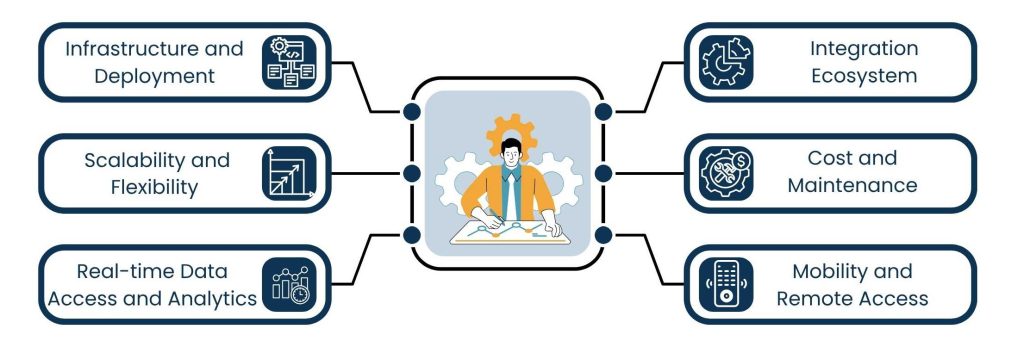Introduction
The marketing cloud automation tech is the hub at which modern businesses manage their digital campaigns. It collects email marketing, customer segmentation, journey orchestration, and real-time personalization capabilities—all core tools under one platform. By powering all of these disparate processes in the cloud, companies can more efficiently connect to their audience, and deliver a consistent experience that improves performance across their channels.
If you are a Start-up evaluating Lead Generation at scale, or if your Enterprise business has millions of customer touchpoints, then the benefits are obvious. Whether it’s streamlining routine tasks or applying AI insights, it keeps marketing fast and flexible.
But in 2025, picking the right platform takes more than a feature comparison. Check how smoothly it syncs with your CRM, whether it can scale with your growth, and how it fits your budget, compliance needs, and ease‑of‑use expectations.
To help you make your decision, we’ve lined up five of the best cloud automation tools of this year – each with its peculiar strength to come to grips with varying business requirements.
Top 5 Automation Tools in Marketing Cloud for 2025
1. Salesforce Marketing Cloud
Salesforce Marketing Cloud still tops the list as a marketing cloud automation software for the future of 2025. Geared towards large marketing organizations, it offers a robust set of features that extend well beyond just email automation. What makes it stand out is the capability to provide ultra-targeted, data-driven campaigns across a range of channels – email, SMS, social media, mobile apps, and web.
Belle executes on the Intelligence layer – Einstein AI – to enable Marketers to predict customer behaviour and best delivery time, and send the most relevant content. It also comes with Journey Builder, a drag-and-drop tool that makes it easy to use complex features.
It’s this sort of thing that Amazon Marketing Hub hopes to make one of its selling points by tightly integrating with Salesforce CRM. This allows sales and marketing teams to use the same dataset for better targeting, segmentation, and campaign performance.

Key Features:
- Sophisticated segmentation and audience insights.
- AI-powered content recommendations.
- Real-time data streaming and analytics.
- Extensive third-party integrations.
- Multi-channel automation workflows.
Best For:
Ideal for frequent communications and RFM-based planning for businesses wanting to scale their comms processes like cloud-based solutions and automations to cope with the volume and complexity of omnichannel marketing operations.
If deep personalization, real-time decisioning, and unified data are required throughout the customer journey, then Salesforce.com Marketing Cloud provides one of the most comprehensive cloud automation solutions available today.
2. Adobe Marketo Engage
Adobe Marketo Engage also stands as a top choice in the marketing cloud automation spectrum, particularly for B2B applications in managing long sales cycles and complex purchaser journeys. With a reputation for superior lead management and lead scoring, Marketo is a household name for marketers.
Marketo’s strong suit is its robust behavioral tracking. Rather than storing data and leveraging it to create a profile, it takes in the live stream of what the user is doing across multiple marketing channels: web, email, mobile, and social, and employs that to “personalize in the moment.” Its email builder and engagement engine can combine to churn out super-responsive, dynamic content like automated drip campaigns, trigger-based emails, and all kinds of personalized eye candy for marketers.
With Marketo’s system and Adobe Experience Cloud being integrated, adding creative content and analytics to your campaigns is made simple. This allows you to keep one consistent experience with your customer on all future touchpoints.

Key Features:
- Smart lead nurturing and scoring.
- Customizable campaign workflows
- Sophisticated analytics and attribution models
- Scalable from small to large teams and datasets
- Integration with CRM and Adobe effortlessly
Best For:
- Mid to Large Size B2B companies that have a focus on lead engagement, pipeline acceleration, and content-first campaigns.
- If you are looking to create engagement that can be tracked as a measure of conversion through experience signposting, prospect journey nurturing, Marketo is a strong cloud platform solution for success.
3. HubSpot Marketing Hub
HubSpot Marketing Hub is also an easy-to-use yet highly effective marketing cloud automation system for today’s businesses. It’s perfect for small to mid-sized organizations that simply need a one-stop shop that doesn’t require advanced IT skills to maintain.
HubSpot is also noted for its ease-of-use and its all-in-one features. And from email automation, to landing pages, live chat, and ad tracking, it’s all closely tied together through the HubSpot CRM. This means you are always seeing the full picture of how your customer has been engaging with you—without having to switch platforms.
The visual editors make it easier to create the automation workflows. Whether it’s follow-up messages, re-engagement plays, or lead nurturing, HubSpot allows marketers to build a series of if-this-then-that logic based on a user’s behaviour or the value of a property within their data.
Better yet, thanks to HubSpot’s analytics dashboard, you’ll be able to see real-time data on how your campaign is doing. You can work quite a bit on the fly, change course and pivot, as you scramble to react to changing conditions, but you can only go so far.

Key Features:
- Visual workflow builder.
- Intelligent content with personalization tokens.
- Built-in CRM integration.
- Lead scoring and email sequence.
- Helpdesk and good knowledge base.
Best For:
SMB and startup companies looking for an inexpensive, easy-to-implement cloud and automation solution to get them up and running.
Whether you are creating a complex marketing campaign that pushes the boundaries of what’s possible or just looking to get the most out of your marketing, HubSpot is a great tool that makes it easy and fun.
4. Oracle Eloqua
Oracle Eloqua is an enterprise marketing platform built for B2B marketing professionals, flexible enough for the most dynamic marketing teams. What sets Eloqua apart is its remarkable capability to manage massively segmented campaigns, sophisticated buyers’ journeys, and multistage lead nurturing at scale.
Eloqua offers an intuitive campaign canvas that allows users to design, automate, and measure how prospects engage with campaigns across e-mail, landing pages, websites, phone calls, and more. Top of funnel engagement to post-sale nurturing can be triggered based on behavior, data changes, or CRM event. If your team can focus on leads with top lead scores and highly refined analytics and personalization, go for it.
Eloqua’s second superpower would be that it is an integration company. It integrates seamlessly with Oracle CX, Salesforce, Microsoft Dynamics, and other top CRM systems, so there’s little conflict between marketing and sales.

Key Features:
- Sophisticated segmentation & multi-level campaigns.
- Rich CRM and third-party integrations.
- Strong data governance and compliance safeguards.
- Adaptive intelligence for personalization.
- Comprehensive campaign analytics and dashboard.
Best For:
Enterprise and regulated customers that need additional automation and governance capabilities and integration with enterprise systems.
If you’re dealing with a lot of personas, channels, and markets, Eloqua is the full cloud automation system designed for precision on an enterprise scale.
5. ActiveCampaign
ActiveCampaign is a top cloud-based automation platform which also caters to small to medium-sized businesses that need an automation tool with extreme power, automation, and without the enterprise-level complexity or price. It integrates email marketing, automation, CRM, and sales tools, all in a convenient and easy-to-use package.
The visual automation builder is one of the more intuitive available. It gives your team the ability to map the process out based on customer action – site visits, email opens, purchases, etc. By using if/then logic, you can design specific paths that adjust to user behavior as it occurs.
ActiveCampaign also enables multichannel outreach such as SMS, site messages and social, eCommerce, and other integrations. The integrated CRM facilitates alignment between sales and marketing and ensures that no lead is lost or forgotten.

Key Features:
- Drag-and-drop automation workflows.
- CRM and sales pipelines included.
- Behavior-based triggers and tagging.
- Affordable pricing for SMBs.
- Over 900 app integrations.
Best For:
This one is ideal for startups, solopreneurs, and small businesses who want cost-effective marketing cloud automation.
If you’re ready to grow your reach with intelligent automation and personalized customer journeys, ActiveCampaign offers enterprise power without the complexity.
Important things to Check in a Cloud Automation platform
So many types of marketing cloud automation solutions in the market can confuse users. To narrow down your choices and make a smart investment, you need to focus on features connected with campaign performance, workflow productivity, and future readiness.

1. Advanced Automation Capabilities
A robust solution will let you design workflows that stretch beyond simple email sequences. Hopefully you’ll be able to create multi-step journeys that respond to user activity, time delays, updating a custom field, and interactions across multiple channels. And visual workflow builders can help streamline the process, even for marketing teams that lack strong technical skills.
2. CRM and Platform Integrations
Whether you’re currently using a CRM like Salesforce or running a full stack system, it’s essential to connect marketing to sales intelligence. This ensures your campaigns are reaching the right leads at the right time, and that you have one single source of truth for your lead data.
3. Personalization and Segmentation
Best cloud automation will also support dynamic content, so you can use personalized fields in one email or landing page, and it will automatically fill out the correct info based on the customer data you’ve got. Combined with sophisticated targeting and tracking to create the most tailored and engaging experiences for the user that convert.
4. Analytics and AI Insights
You should see real-time open rates, click-through rates, conversions, and assign campaigns at your fingertips so you can make the calls with confidence. Some go further with AI-fueled advice: what to do next; when to do it, or new subject lines to test after you’ve tested.
5. Scalability and Support
But as your business grows, so too will your automation needs. The correct platform should be able to support additional contacts, additional campaigns, and additional sophisticated logic without having to rip and replace everything. In addition to quality of service capabilities, robust customer support, onboarding materials, and an engaged knowledge base can mean the difference in your team’s success.
6. Data Security and Compliance
That can be especially crucial if you work in a regulated industry: seek out platforms that provide security around data, access controls, and native compliance support for GDPR, CAN SPAM, and other privacy laws.
By 2025, the ease and availability of cloud-based marketing systems isn’t a convenience—it’s an advantage. Select a solution that has the optimal mix of these aspects to make your marketing future proof and support business expansion.
Cloud Automation vs. Traditional Marketing Automation: What’s the Difference?
One of the questions I hear most often is probably, How does marketing cloud automation differ from marketing automation systems we’ve traditionally used? Both are created to make running a campaign easier and tap into the power of lead nurturing, but the way they’re built, the elasticity they offer, and the results you can expect are very different.

1. Infrastructure and Deployment
Conventional marketing automation solutions are commonly offered as on-premise solutions. This is because they need internal servers, IT support, and regular software updates. On the other hand, cloud automation platforms are located and operated by vendors across the internet. And there’s no need for any physical infrastructure and updates; patches, and performance improvements come automatically. This cuts down reliance on internal IT resources and accelerates time to value.
2. Scalability and Flexibility
Traditional methods often struggle to scale efficiently. Adding new users, or integrating features, can quickly become costly and time-consuming. On the other hand, marketing platforms in the cloud scale up surprisingly easily. Then, as you scale your business or increase campaign volume, you upgrade your plan or certain features without having to replace your entire system. Expansion-stage tools are thus ideal for both expansion-stage startups and scale enterprises.
3. Real-time Data Access and Analytics
Legacy tools likely do not have real-time performance monitoring and may rely on batch updates or manual data pulls. Automation tools in the cloud are designed to enable real-time access. Marketers can quickly view open rates, click-throughs, lead behaviors, and conversion metrics by channel. This allows for quicker decision making and more nimble campaigns.
4. Integration Ecosystem
On-site platforms need personalized development work to integrate with third-party apps; this can delay time-to-market. While cloud-based platforms come with inbuilt CRMs, eCommerce platforms, CMS tools, Analytics, etcetera.
APIs as services or via preconfigured connectors. This means that all of your marketing stack works in concert.
5. Cost and Maintenance
Historical tools tend to be expensive with large upfront licensing fees and ongoing IT maintenance requirements, and occasional upgrades. Cloud solutions employ subscription pricing, which is more predictable and often cost-effective. No dedicated infrastructure or software specialists are required, minimizing the total cost of ownership over time.
6. Mobility and Remote Access
Cloud automation helps marketers derive analytics, and optimize campaigns on the go. Traditional systems are on-premise servers, so you can only access them from your office network or VPN.
In a nutshell, Marketing Cloud automation provides the flexibility, integrability, and scalability that the old boys just cannot. And in a world where marketing will be even more data-driven and multi-touch, and where marketing is about the speed of the cloud, cloud technologies have the speed and agility that companies need to keep up in 2025 but in 2030 and beyond.
Conclusion
And as we move into 2025, we’re only getting started; marketing cloud automation is no longer just another cool feature; it’s a strategic must-have. This is part of a theme where every company at every level is trying to make its business tighter, focus the experience for customers, and be more responsive to the changes in the marketplace. Cloud automation tools help you be able to do all of this, enabling intelligent workflows, real-time information, and multi-channel engagement in one end-to-end system.
The five featured platforms in this blog post, Salesforce Marketing Cloud, Adobe Marketo® Engage, HubSpot Marketing Hub, Oracle Eloqua, and ActiveCampaign, all have their strengths. Your decision will be based on your company size, technical ability, growth aspirations, and the complexity of marketing strategy your operation demands.
But the platform decision isn’t just about features; it’s about fit. The highest-rated cloud and automation platform for a reason: the one that exists in your world, the one that is integrated into your ecosystem, the one that grows with your orders and ultimately makes just doing your job so much easier.
In the final measure, marketing success in 2025 is the domain of the teams who are marrying automation and agility. With the right tool in place, we’re not just starting campaigns, we’re establishing relevant, state-of-the-art-based connections at scale.
About Us
Tasks Expert offers top-tier virtual assistant services from highly skilled professionals based in India. Our VAs handle a wide range of tasks, from part time personal assistant to specialized services like remote it support services, professional bookkeeping service etc. Furthermore, it helps businesses worldwide streamline operations and boost productivity.
Ready to elevate your business? Book a Call and let Tasks Expert take care of the rest.









